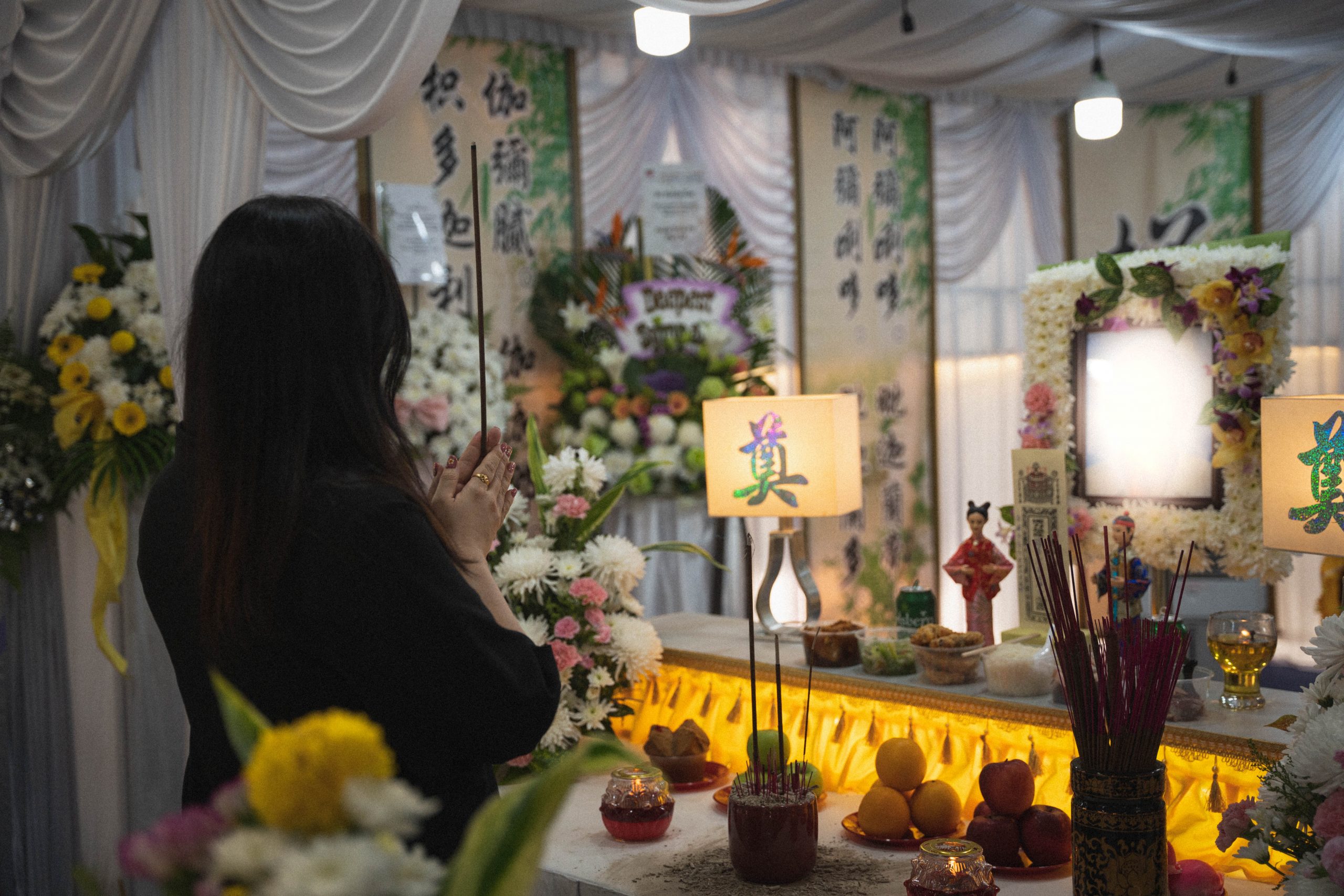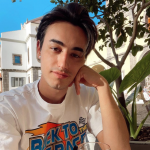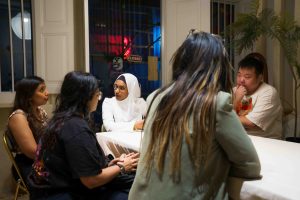All photography by Marisse Caine and Zachary Tang for RICE Media unless otherwise stated.
Death is a strange topic. It awaits us all, yet we rarely speak of it. It’s a taboo topic, and it’s also emotional. And when it comes to funerals, most of us don’t know much about them until we start attending them, or are thrown into the deep end having to plan one.
Yet there’s beauty in funerals. They are ceremonial. Respectful. They bring families together. They remind us of the fragility of life. And in Singapore, funerals have taken on a format of their own with the use of void decks.
“Nowhere else in the world can you find a place where the dead and living coexist under one roof,” said Nicky Teo, the 32-year-old founder of Funeral Solutions when asked about void-deck funeral wakes.
“Growing up in Singapore, I assumed that the use of the void deck for funeral wakes—or the equivalent of which—was normal practice across the globe. I was wrong. Void deck ceremonies are an integral part of Singapore culture,” Teo emphasised.
“It’s beautiful that a deceased can be celebrated where they lived,” Teo exclaimed. “Upstairs it’s households, downstairs it’s funerals.”
“It’s all a part of kampung spirit,” I replied jokingly. He agreed.
Void-deck funerals represent the way culture is shared and mixed in Singapore, as the practice has become common among all the cultures on the island, particularly the Indian Hindu community.
SV Khanthan, Managing Director of Singapore Indian Casket, has noticed that funeral rites are modernising as younger generations take over the role of planning funerals for their families: “Our younger clients prefer to hold wakes at the void decks or in parlours instead of within households.”
While Hindu funerals vary depending on religious sect, traditionally, the body should remain at home. First, it is to be cleaned and shrouded with holy ashes while prayers are performed. Then a wake is held at home for mourners to visit before the deceased is cremated within 24 hours or a few days. While some families bring the ashes back to the Ganges or other holy sites in India, others opt to scatter the ashes in designated waters near Pulau Semakau.
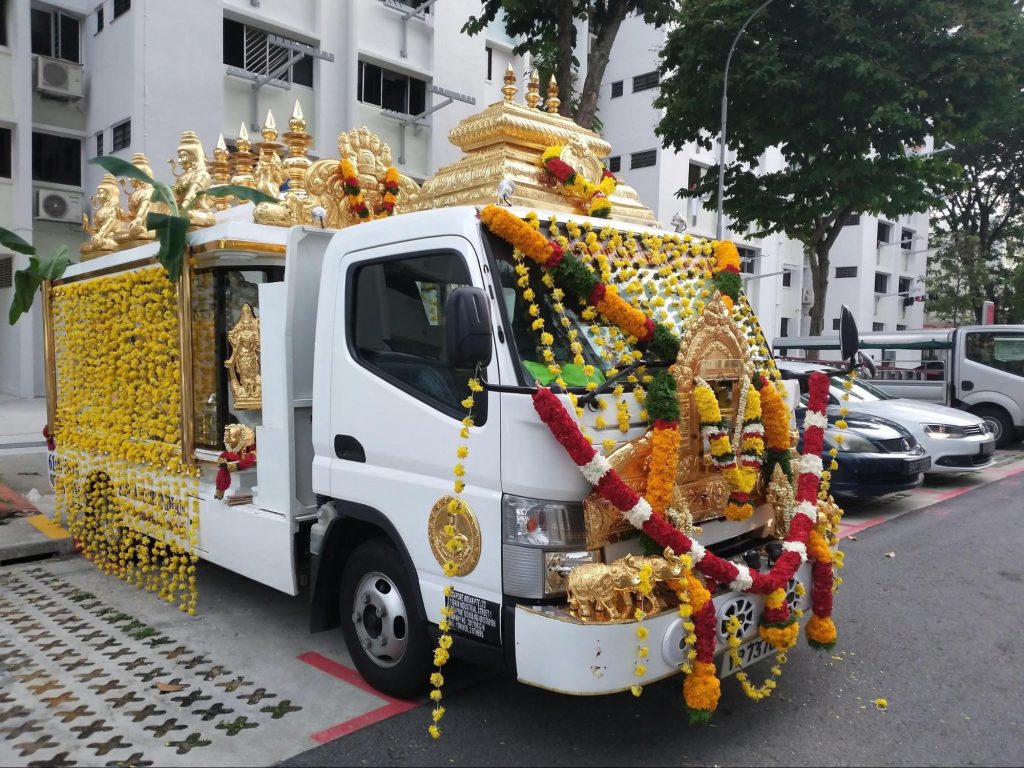
As the Indian community embraces the use of void-decks, some of the traditional rites are changing. For example, religious leaders will be hired to lead prayers at void decks, and family and friends will gather there rather than at home.
But as the void deck wake diversifies, it is also threatened: “People have less tolerance now for noise,” Teo said. “There are more noise complaints than in the past, so it’s hard for a full-fledged traditional wake to last until the wee hours.”
Jessman Wang, the founder of Singapore Funeral Directors, says he has seen more and more people adopt the practice of void-deck funeral wakes, and therefore, doesn’t see the tradition going away anytime soon.
Most of the funeral directors I spoke to agreed. But they now have to remain vigilant and continue to adapt their funeral work arrangements to suit the changes new generations seek.
Non-Religious and Cross-Cultural Ceremonies
One of the biggest changes in the type of funeral services both Teo and Wang face is the increased demand for non-religious services, also known as ‘freethinker funerals’.
While this is partly due to an increased number of Singaporeans who don’t practise any religion, it is also largely a consequence of an increasing number of families of mixed heritage.
“When a parent passes, the children may practise different religions,” Teo explained. “So they often opt for a freethinker funeral to avoid discussions.”
Also, while a funeral can remove religious affiliations, it still has to draw from a specific culture when it comes to the ceremony. For example, clients will need to choose between a Chinese- or Western-style funeral. Or they may opt to use the elements of their cultural heritage without the religious aspect.
In a similar way, Catholic funerals in Singapore feature an intermix of culture and religion.


“If they are Chinese Catholic, they will carry out the funeral in a culturally Chinese way,” Wang said. “But at the end, the coffin has to be sent to a Catholic church where a priest will do a funeral mass, and the priest will pray for the redemption of the sins of the deceased.”
Similarly, Indian Catholics will have a ceremony akin to their cultural practice—with traditional clothing, flowers, and so on—but with a priest present, or with the addition of mass in church.
Changing Traditions
As freethinker funerals become more common, many cultural practices within religious groups are either changing or relaxing. For example, Wang told me that many Chinese communities opt for Buddhist funerals even if they are Taoist, as Buddhist ceremonies are more succinct and involve less complex prayers.
Muslim funerals are also seeing changes—but that doesn’t mean the customs are relaxing.
“Ten to 15 years ago it was culturally acceptable for families to bring the body home, clean it up, and change the clothing themselves. Now, most people don’t do it without the supervision of a funeral director,” said Mohamed Ali, founder and director of Muslim funeral service company Persatuan Khairat Kematian Singapura.
“In some cases, they will let the funeral director come and wash up the body and shroud it. If they are close family members, they may be involved but with the direction of the funeral director.”
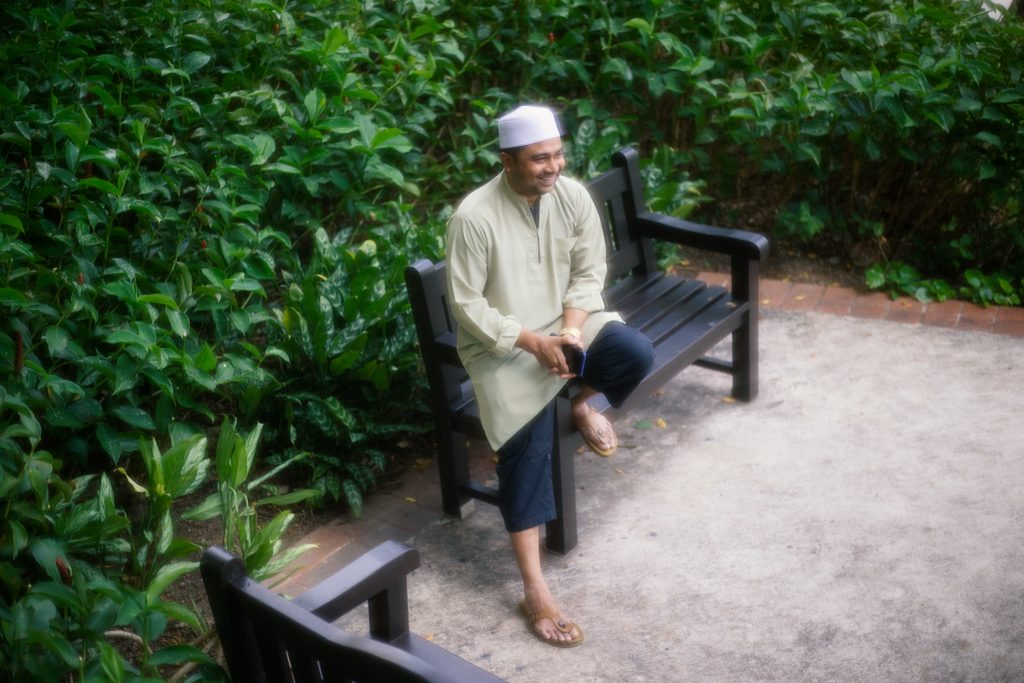
Ali explained that Muslims believe that when someone dies, their soul is said to be pulled out of the body, which is why the shrouding process needs to be done gently and in accordance with Islamic rites.
Wherever you go in the world now, Muslim funerals follow specific rites under the Islamic faith, so they are generally standardised everywhere.
Modern Funerals
Ali, Wang, and Teo are all constantly keeping up with changing demands customers have for funeral services and wakes.
For Wang and Teo, these tend to come from younger generations who are less tied to traditions and instead opt for comfort and practicality. It may sound banal, but Wang jokes that having a coffee machine at wakes makes all the difference. Thinking about it, it makes sense, since some traditions require families to stay overnight to watch the body.
Another service Wang has started offering is that of an emcee. He first saw this at a funeral in Taiwan two years ago and brought the concept to Singapore.
I asked why someone would want an emcee at a funeral. It’s simple, he said. Some individuals don’t want to read eulogies to the public when they are grieving—or simply because they are shy.
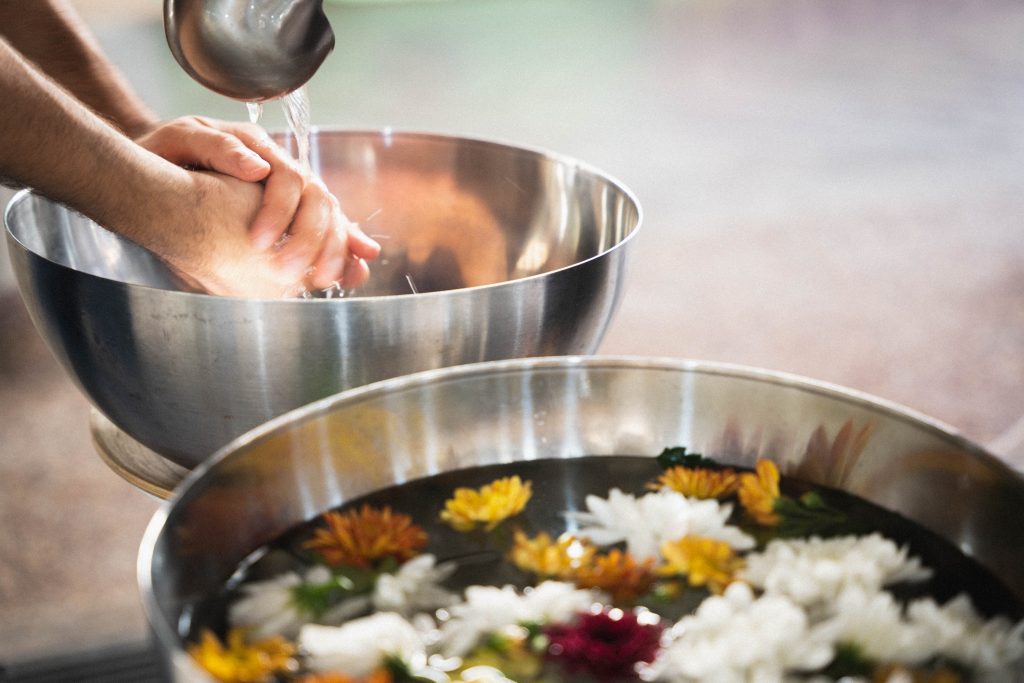
He showed me an example via a testimonial recorded with his phone: “The eulogy one of our funeral directors prepared… helped turn a heartbreaking situation into a loving tribute.”
The same shift towards more interactive funerals has been observed in the Hindu community as well. In the past, Hindu funerals didn’t involve eulogies. Now, an increasing number of families want to have them.
Wang also shared that “technology is the future of funerals,” referring specifically to the latest adoption of livestreaming.
Many of the wakes he organised for clients during and after the circuit breaker involved setting up a livestream. “A camera crew will follow the coffin to Mandai, and film the cremation process,” he said. “The family will be at the wake watching from a TV. The ceremonial prayers are also streamed.”
As for Muslim funerals, Ali has also made changes to a few of his processions to make funerals during the pandemic a smoother operation.
Traditionally, the body should be washed and buried on the same day. If the death happens at night, the washing will take place the next morning before the funeral, leaving a few hours for visitors to pay their last respects.
“Usually, the washing will be done a few hours before the family wants to leave for burial. Now, if the death happens at night, we will go straight away to wash and shroud,” he said.
“We can’t have too many people around at once to pay their respects because of COVID regulations, so that leaves the entire night for visitors to come by.”
Continuously Evolving
Wang, Teo, and Ali all brought up the importance of community outreach and education about funeral rites in Singapore, as many individuals are uninformed about different death rites and who to contact in moments in crisis.
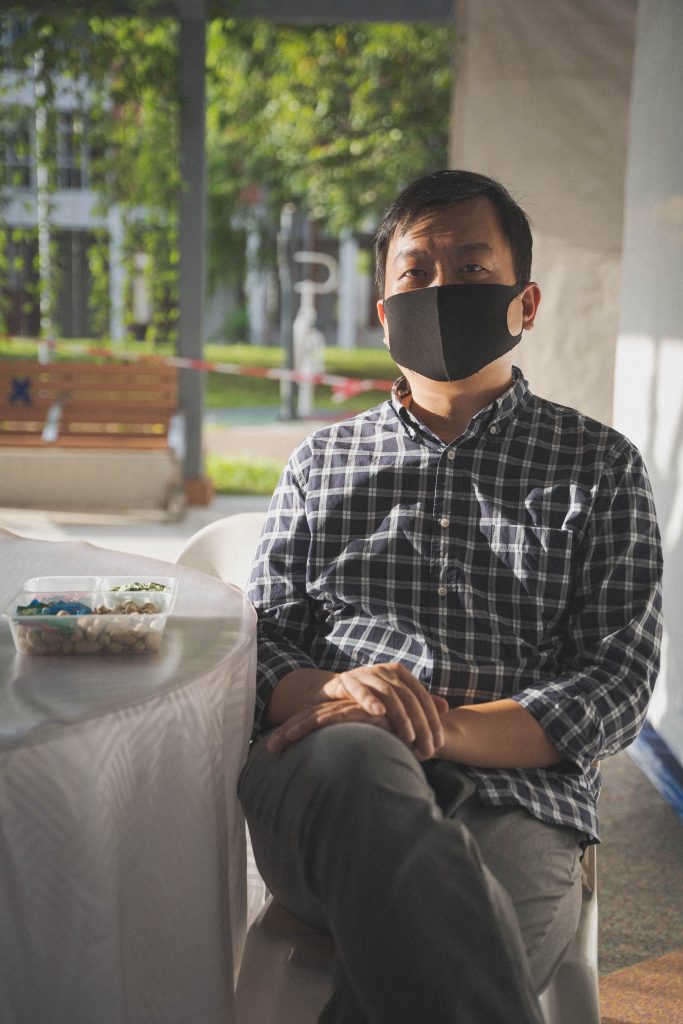
Teo said that it’s “hard to educate people about the correct cultural practices behind funerals. People are not interested or shy away from talking about it, meaning a lot goes unsaid. Also, many don’t know how to do proper funerals or what to expect, so some funeral directors shortchange the customers.”
As I hear this, I’m reminded that while funerals evolve, they continue to serve the same purpose—to send off a loved one with dignity and respect. And this is why they are such an important fabric of our society that almost unites us, because no matter the culture or religion, death awaits us all.
It still is weird to talk about death. But a great starting point is the acknowledgement of the rich culture that exists around funerals, and the continuous effort needed to stay educated about various practices and misconceptions.

